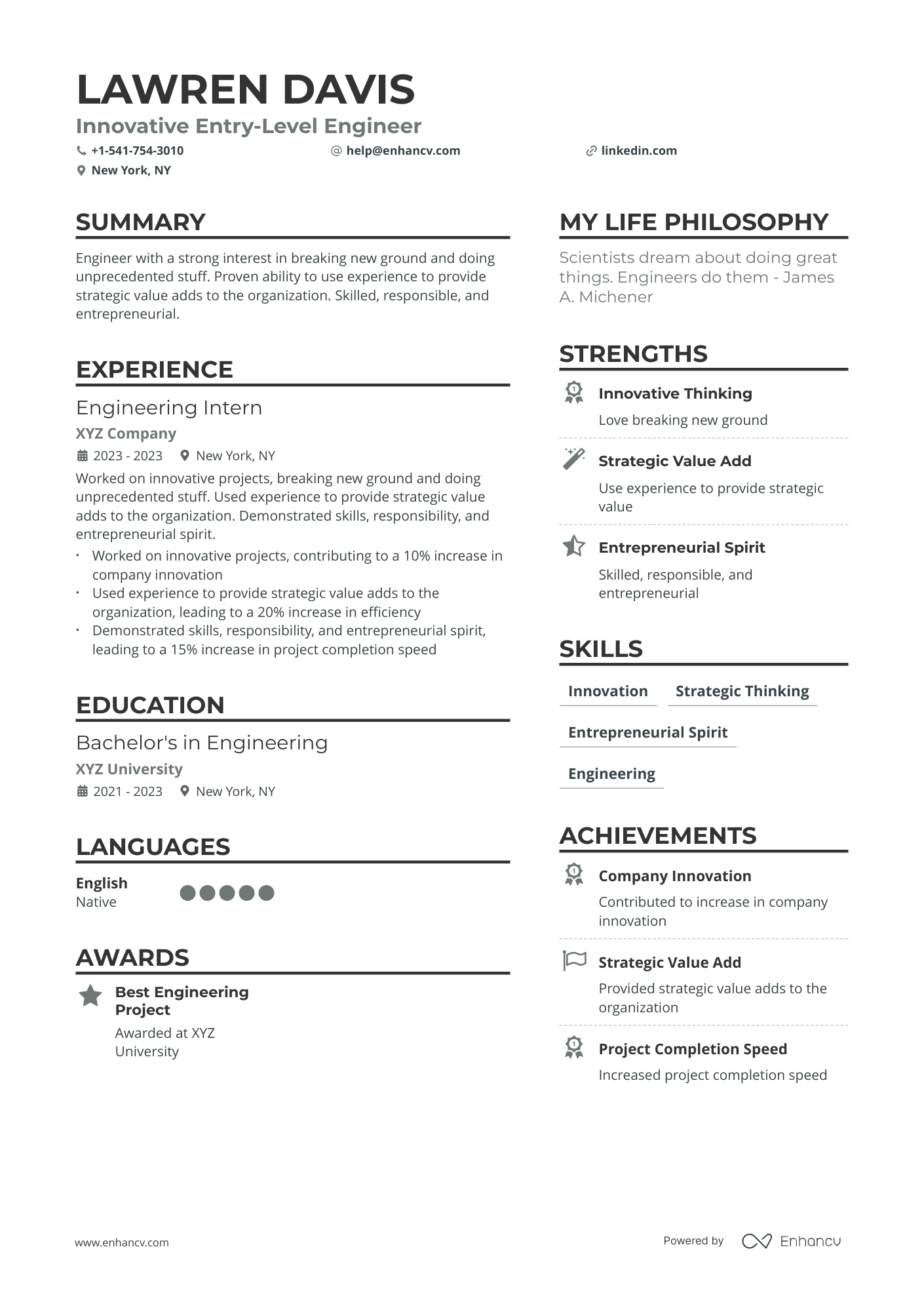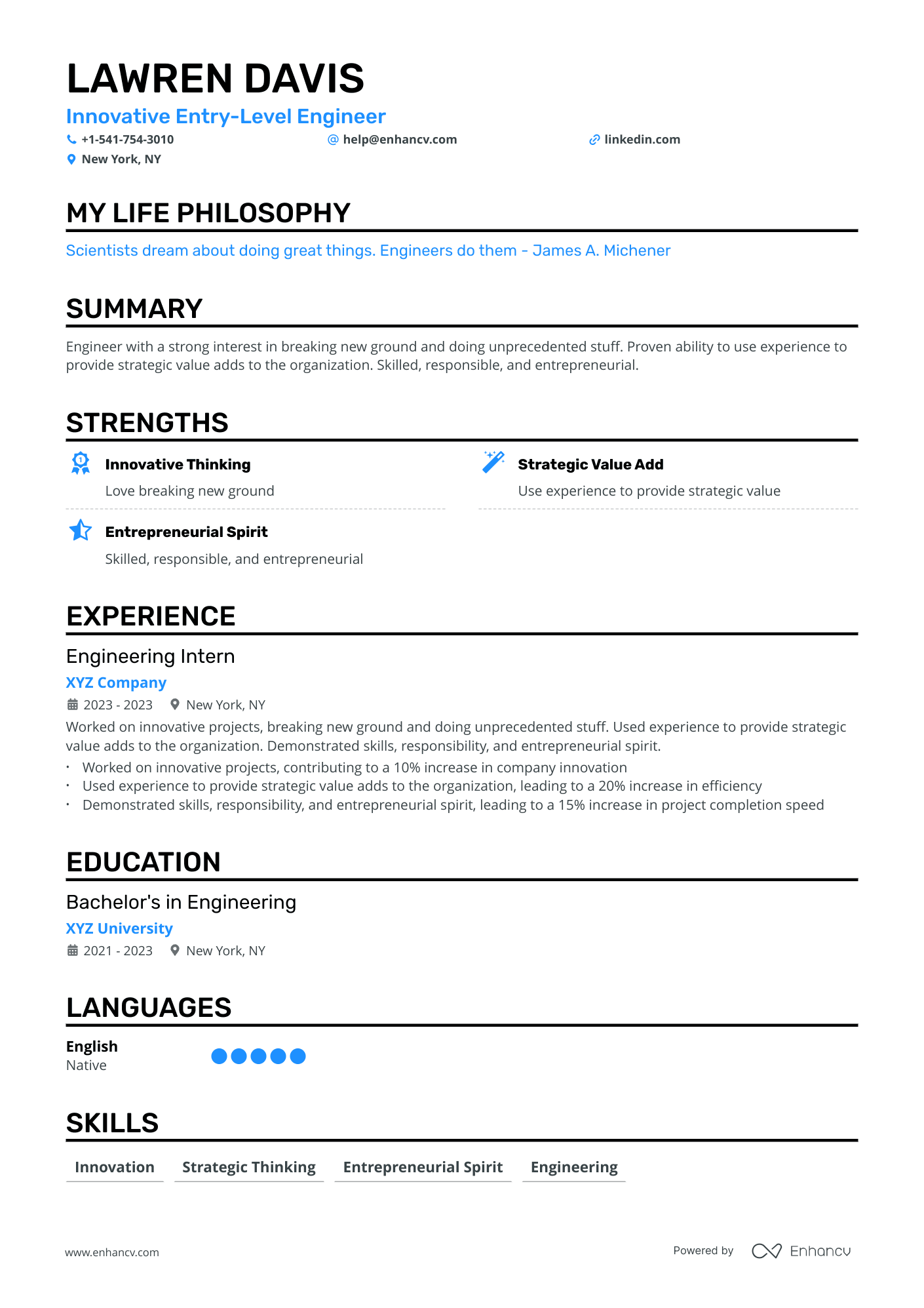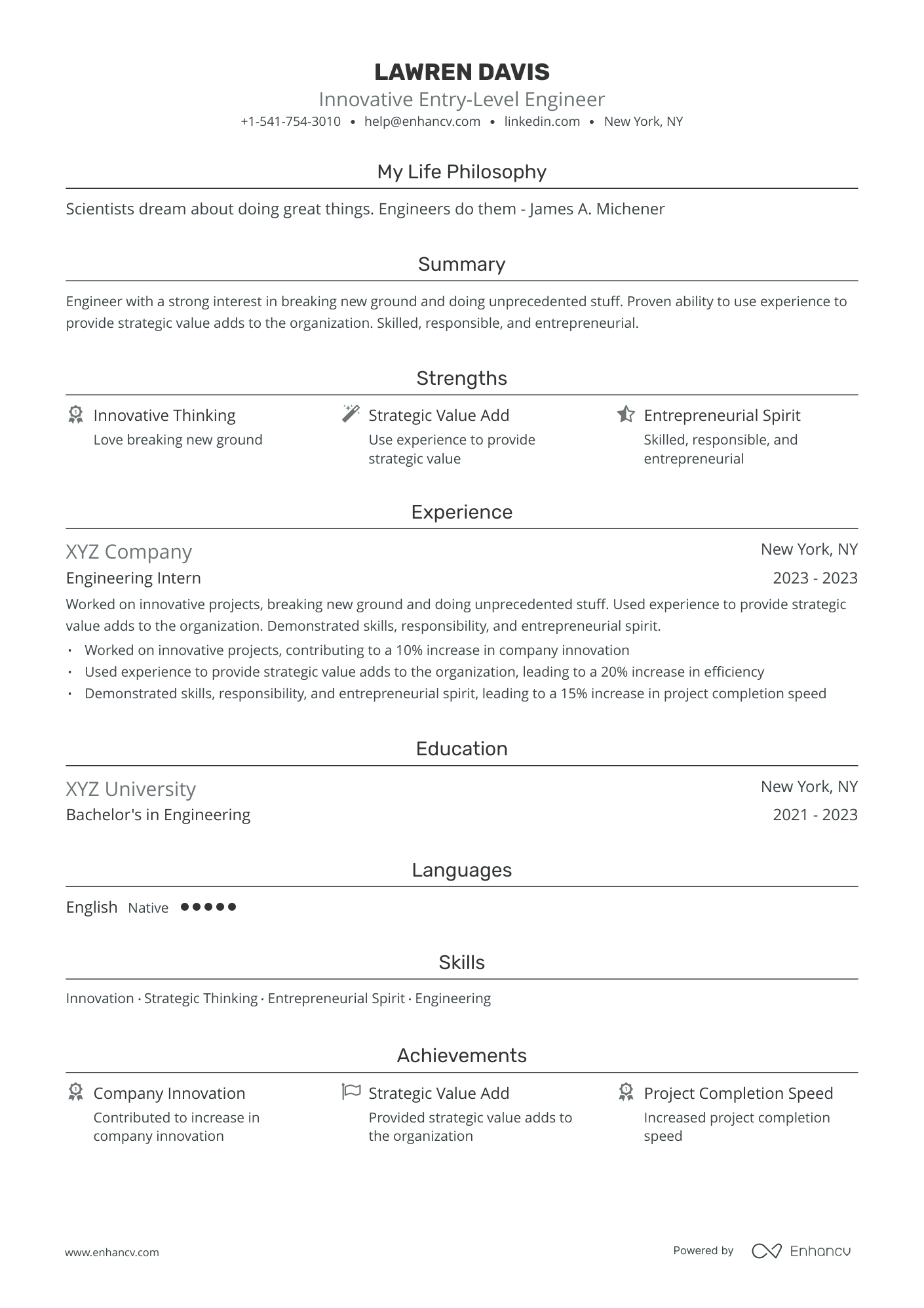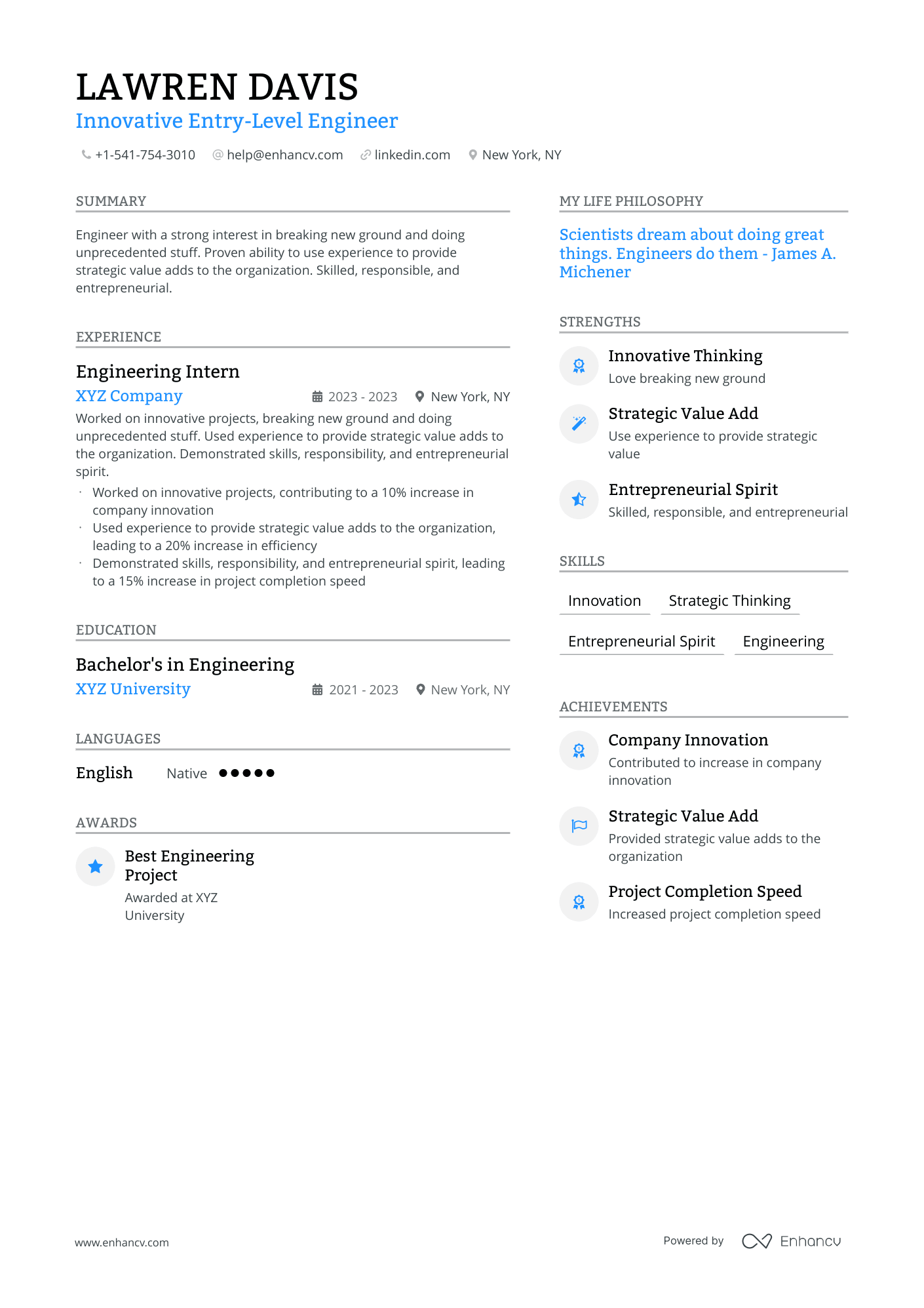There was a story about this graduate who was looking for his first job in the engineering world.
Over a few years he applied to 400 job listings with his entry-level engineering resume.
Do you know how many interviews he got? Three.
Do you know what the problem is? These days that’s considered a success.
Mechanical Engineers, for example, send out an average of 100 resumes before landing an interview and then wait up to 90 days before getting a job offer. That’s if they even get one.
Are you ready to send your first 100 resumes? That’s what we thought.
How about we help you to create a highly effective entry level Engineer resume and possibly cut this number in half. Or more.
How? You gotta know the game. Read on.
This Entry-Level Engineer resume will teach you:
- How to make use of our 10+ resume examples from real candidates.
- What are the biggest myths in entry-level resume applications?
- Which resume layout works best for entry-level Engineer resumes.
- How to show your soft skills without coming off too vague.
- How to emphasize your education and certification sections for greater impact.
Looking for related resume guides? We got you covered.
- Entry-level Mechanical Engineer resume examples
- Electrical Engineering resume examples
- Industrial Engineer resume examples
- Manufacturing Engineer resume examples
- Quality Engineer resume examples
How to write an entry-level engineering resume: getting started
Finding engineering work is tough, we already know that much. What you don’t know, however, is that most advice you hear on how to write an entry-level engineering resume simply won’t work.
Myth #1: “Play the numbers game. Send as many applications every day as possible and eventually you’ll land an interview.”
You can’t play the numbers game, because the game is rigged.
Recruiters look for very specific things (we’ll talk about those very soon) in your entry-level engineering resume.
If you get those wrong, you’ll be rejected again and again no matter how many resumes you send out.
Myth #2: “I have a GPA above a 3.0, I’ll have no problems getting this job”
GPA alone doesn’t matter much. In fact, there are at least two things that mean more to recruiters on any given day: internships and relevant experience.
Our HR won't even pass the resume to me without the keywords ‘internship’ or ‘co-op’ (cooperative education), but then again we get over 150 applicants for our entry level positions.
Engineer lead on Reddit.com
We’ll talk about what to do about that in your junior engineering resume in the “Summary” and “Experience” sections.
Myth #3: “All that matters are my technical skills”
[In your Summary:] “I know AutoCAD, MATLAB, Excel…” just stop. The recruiter is already reading the next resume.
Yes, technical skills are the bread and butter of your profession. Yes, you diligently learned them. Yes, you have them. So do all of your 20+ classmates actively looking for a job.
How do you stand out?
In the eyes of employers, tech skills are something you can learn while working. You can learn all the missing technical skills you need during the first two months of your job anyway.
On the other hand, who will teach you soft skills? Leadership, communication, collaboration - these you can’t teach in two months. And yet, successful engineers need them.
The ability to work on big projects, to build relationships with clients, to help people - those are the qualities that will make your resume stand out.
Even if you demonstrated those doing volunteer summer work.
We’ll talk more about soft skills and how to effectively present them in your entry level Engineer resume’s “Skills” section.
Let’s talk about how you structure all those sections in your resume.
What’s the proper layout for entry-level Engineer resumes
Even though you’re applying for an entry-level Engineering position, your resume should be nothing short of a professional looking document.
It should present your strengths and experiences in a clean and structured manner.
The sample entry-level Engineering resume example we’ve included above is built on the theory behind Hybrid resumes.
In hybrid resumes, both skills and work experience are key sections that bring a cohesive narrative of your work history.
Have a look at our article to learn more about how to create the best hybrid resume.
Afterwards, you’d only have to make sure you’ve picked up a legible and professional font to finish off a great design.
You’re now ready for the next step and fill the layout with the relevant resume sections.
Let’s have a closer look at each of them separately.
For more information on the best resume formats, read our guide: The Best Resume Formats You Need to Consider (5+ Examples Included).
Entry-level engineering resume header: how to make it short and sweet
Even though most entry level jobs have the word “Entry” in their title, you don’t necessarily need to insert this word in your resume header.
This title gives off a rookie vibe. The thing is, most companies, even when looking to fill entry-level positions, prefer candidates with at least some experience.
That is why you often see “0-3 years of experience” in their requirements.
If you apply with “entry” in your header, your resume will automatically have a lower priority because it gives off this “inexperienced” vibe.
To raise your chances, use a title that is close or relevant to the position you’re applying for, e.g. Civil Engineer, Mechanical Engineer and so on.
Also notice that you missed an opportunity to demonstrate your social skills.
What about your LinkedIn profile? It provides evidence that you have connections and can network. Talk about soft skills.
Also, in your LinkedIn profile you can demonstrate memberships in major engineering organizations, such as ASME or EYE (European Young Engineers).
If you want more ideas for stand-out resume headers, read through our guide Perfecting Your Resume Header so You Get Noticed.
Your header signals experience and even slightly hints at your developed soft skills. Let’s grab the recruiter’s attention with a catchy summary.
How to make your student or entry-level engineering objective memorable
The summary is, perhaps, the most critical section of your entry-level engineering resume. If you got it wrong, recruiters won’t even bother reading further.
So how do you write it? To answer this question, we should first talk about how you don’t write it.
Anything below a GPA of 3.0 automatically urges recruiters to stop reading your resume. The national average is 3.0 and most engineering jobs aim for that number.
If you have a lower GPA, it's not the end of the world. Just don’t mention it. Especially don’t start your resume with it.
If anything, the first things you need to mention in your resume summary are internships and co-ops. If you have them, by all means monetize on that.
It sets you apart from all the candidates that don’t have those.
If you don’t have internships, you have to focus on work-related experience. Don’t just list your technical skills.
You’ll have a “Skills” section for that.
Instead, bring up your biggest achievements relevant to the position you’re applying for.
These may be: volunteer work, outside the classroom activities, college special projects and your role in them. Just keep it short.
If you have a lot to talk about, consider writing a cover letter.
For more tips on crafting an attention-grabbing resume summary, check out our guide Resume Summary: How-To Guide (30+ Examples You Need To See).
If you’re looking to craft a compelling resume objective instead, read our writing tips at 10 Resume Objective Examples You Need to Steal (How-to-Guide).
After writing a convincing summary section, what is the next step? Your experience section.
Optimize your resume summary and objective for ATS
Drop your resume here or choose a file.
PDF & DOCX only. Max 2MB file size.
Entry-level engineering resume experience section: things to know
How do you write your experience section, when you have no experience? Change your perspective.
Look at it this way: you do have some experience. Just not in the sense that it is commonly meant.
Student projects, volunteer work, internships, and personal projects - you can write about anything that is relevant to the position you’re applying for, or that is relevant to engineering as a whole.
Tip #1: if you graduated in engineering several years ago and have had only irregular work history since then, remove the dates.
Also, if you had an engineer internship several years ago and are looking for an engineering job just now, consider removing those dates from your resume as well.
The fact that you had an internship should not be offset by how long ago you did it.
Tip #2: put the most relevant skills and work-related experience at the top.
If a position requires experience with CAD tools, emphasize it. Same with handling reports to Senior Engineers and developing project documents.
But don’t just blindly copy requirements from the job description, they are usually very vague and generic. Be specific in what you did.
- •Performed routine tasks assigned by engineers
- •Participated in electrical engineering for buildings
- •Developed plan drawings
There are three things that are wrong here:
- The experience is generic with no specific tasks mentioned. “Performed routine tasks” could mean mopping floors.
- No collaboration experience — recruiters can’t tell if you work well with others.
- No technical skills mentioned, which is a missed opportunity.
Here is how it’s done.
- •Worked in a team environment with other engineers and designers to design power (critical, life safety, emergency), lighting, data communications, and integrated process control systems.
- •Performed power, lighting and grounding calculations at the direction of mid and senior level engineers
- •Utilized AutoCAD and Revit to develop schematics and plan drawings
There are over 40 engineering degrees and your experience section for each one of them will look differently.
However, the key takeaways are the same: show your soft skills, collaborative experience, and technical skills while being specific about what you did.
Here’s a final example of the experience section for an entry level Mechanical Engineering resume. Observe mentioning of technologies and job-specific responsibilities.
- •Worked closely with equipment suppliers and plant staff to ensure successful operation of the plant.
- •Participated in the creation of preventative maintenance routines and bills of materials for new equipment.
- •Worked with modeling CAD tools to create mechanical models and accompanying drawings
For more ideas on how to create an actionable resume experience section, check out our guide How to Describe Your Resume Work Experience.
What skills to feature on an entry-level engineer resume
Most employers prefer T-shaped applicants. These individuals demonstrate a technical depth in their area of study as well as soft skills and different interests.
What that means is that it’s equally important to reflect both technical expertise and soft skills in your entry level Engineer resume.
Let’s start with technical skills.
Technical skills are the bread and butter of any engineering job and it’s critical to list them on your resume.
However, it’s even more critical for entry-level Engineer resumes, because those are most likely to be scanned by ATS robots for certain keywords.
While engineering responsibilities vary greatly from job to job, there are some technical skills you’ll see in most of the job descriptions.
Entry-level Engineers do a lot of project documenting and calculating while learning the ropes with senior Engineers, so make sure you mention tools like CAD, MATLAB, Microsoft Office.
Although not required, coding skills look great on an entry level Mechanical Engineering resume and most others.
Skills in Python and C++ allow you to automate many engineering tasks.
Also, the number of embedded robotics and automation jobs that need Mechanical Engineers with coding skills is growing every day.
Same with BigData — it’s not necessary, but can give you an edge for certain positions.
Top 7 technical skills for engineering student resumes
- CAD/CAE/CAM
- MATLAB
- Microsoft Office
- Python
- C/C++
- Revit
- SolidWorks
Now to the soft skills.
Soft skills are extremely valuable for entry level Engineers, because usually no one is deliberately teaching or studying them.
Yet, it’s important for Engineers to work well in a team, to effectively communicate their ideas and to successfully lead projects on their own.
So far we’ve tried, given the importance of soft skills during the resume screening process, to emphasize or hint at them in every previous section.
However, there is a devoted section for Soft skills and you’re reading it right now.
Don’t be generic.
There’s a huge temptation to simply start listing skills like “communication”, “leadership”, and “time management”.
There is a problem, though. Everyone is doing it. Recruiters don’t like generic resumes. They look as if they were written by someone else.
Or worse, they were written by someone who is not enthusiastic about a new job.
In any way, here’s how you write about your soft skills.
Don’t: Organization skills. Do: Organized student and local ASME conferences.
Don’t: Communication skills. Do: Was a key speaker at 2018 Boston ME Student Fair
Don’t: Leadership. Do: Led a student engineering project that won 2nd place at U.S.A Young Robotics competition
If any of your engineering student projects were covered by news or authoritative engineering publications, mention that too.
Are you still not sure what skills will win recruiters over? Check out our guide on How to Create A Resume Skills Section To Impress Recruiters (+10 Examples You Need to See).
Now let’s talk about your education.
Entry-level engineering resume education: how to position it
Almost every junior engineering position requires relevant education.
The only possible exception would be if a candidate has a relevant field experience.
There are over 40 engineering degrees. Some of those might be highly relevant to the job (e.g. Aerospace Engineering graduate going for NASA).
Others not so much (think Chemical Engineering graduate applying to Civil Engineering job).
If your education features a prestigious university (think USA top 10) and a relevant degree, by all means put the education section as close to the top as possible.
If, however, your education is not that relevant or you have a low GPA, de-prioritize this section and put it after your skills.
If you have a GPA above 3.0, emphasize it (e.g. make bold). IF, however, your GPA is lower than 3.0, consider not mentioning it altogether.
Browse more essential tips on how to feature education on your resume, in our guide Perfecting the Education Section on Your Resume.
What certificates to add in my entry-level engineer resume
Certifications are a valuable asset for any engineering graduate.
There are three types of certificates that might be helpful to you:
- Engineering certificates (FE)
- Technical tools certificates (AutoCAD certification, MATLAB)
- Engineering-related certificates (project-management & statistics Sigma6, ANSYS)
It’s a common job requirement for entry-level Engineers to pass the FE exam (The Fundamental of Engineering).
If you passed the FE and the job explicitly states it as a requirement, consider mentioning it not only in the Certification section, but also in your Summary or Experience sections.
Top 8 entry-level engineering certificates
- FE/EIT
- AutoCAD certification
- Mathworks (MATLAB)
- Solidworks
- ASME
- Sigma 6 (PM & QC)
- IIT
- ANSYS
Keep in mind that for every engineering branch (mechanical, civil, GM, electrical) there are specialized certifications. If you have those, prioritize them over technical ones.
For more information on how to properly list resume certifications, we recommend reading our guide How To List Certifications On A Resume (Examples Included).
Other sections to include on your resume
Depending on the company, job seniority level and your location, you may want to include more sections to your Entry-Level Engineering resume:
- Language skills
- Hobbies and interests
- Projects
- Volunteer work
- Highlights
- References
- LinkedIn on Resume
- GPA
Summary and action points for your next entry-level engineering resume
It’s better to spend some time writing a good resume than to spend time sending out a bad one.
Follow the advice in this guide and position yourself above the competition, because it’s quite fierce.
Here are the key takeaways from this guide:
- Focus on building a T-shape perception of your resume: combine deep technical knowledge with developed soft skills
- Emphasize your GPA only if it’s above 3.0
- Most likely you have engineering experience even when you think you don’t - focus your attention on what you did relevant to the position
- If you have an internship or co-op experience, prioritize it above anything else in your entry-level engineering resume




